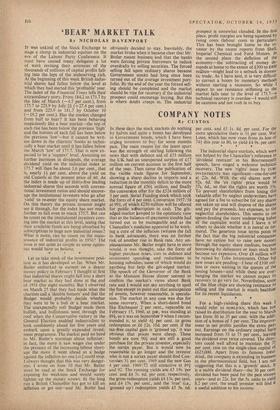`BEAR' MARKET TALK
By NICHOLAS DAVENPORT
IT was unkind of the Stock Exchange to stage a slump in industrial equities on the eve of the Labour Party Conference. It must have caused many delegates a lot of work revising their estimates of the thousands of millions of capital profits fall- ing into the laps of the undeserving rich. At the beginning of this week British indus- trial shares had fallen below the level at which they had started this 'profitable' year. The index of the Financial Times tells their extraordinary story. From 184.2 to 175.7 by the Ides of March (-4.7 per cent.), from 175.7 to 223.9 by July 21 (+27.4 per cent.) and from 223.9 to 181.7 by October 10 (-19.2 per cent.). Has the market changed from bull to bear? It has been behaving suspiciously like a bear market-the top of each rise has been below the previous 'high' and the bottom of each fall has been below the previous 'low'-but it cannot be writ- ten down in the chartists' books as techni- cally a bear market until it has fallen below the March 'low' of 175.7. That is now ex- pected to be a 'support' level. Assuming no further increases in dividends, the average dividend yield on the industrial index at 175.7 will then be about 5.6 per cent., that is, nearly 14 per cent. above the yield on old Consols at the present price of 60. As the index is made up of thirty-five leading Industrial shares this accords with conven- tional investment ratios and should encour- age the institutional investors who go after 'yield' to re-enter the equity share market. On this theory the private investor might see it through, for the index has not much further to fall even to reach 175.7. But can he count on the institutional investors com- ing into the market at this level, seeing that their available funds are being absorbed by subscriptions to huge new industrial issues?. What is more, can he count on the main- tenance of industrial profits in 1956? Thee issue is not quite as simple as some optim- ists would have us believe.
Let us take stock of the investment ,posi- lion as it has developed so far. When Mr. Butler embarked in earnest on a dearer money policy in February I thought at first that industrial shares might fall into a short bear market as they had done at the end of 1951 (for eight months). But I observed on March 25 that they had made what the chartists call a 'double bottom' and that the Budget would probably decide whether they were to be a bull or a bear market. The unexpectedly soft Budget made them bullish, and bullishness went through the roof when the Conservative victory in the General Election enabled industrialists to look confidently ahead for five years and embark upon a greatly expanded invest- ment programme. The market paid no heed to Mr. Butler's warnings about inflation : in fact, the more it saw wages rise under the pressure of the increasing labour short- age the more it went ahead as a hedge against the inflation no one [sic] could stop.
I always thought that this was very danger- ous. 1 wrote on June 10 that Mr, Butler must be mad at the Stock Exchange for exposing his weakness and would surely tighten up the money screws. In the long run a British Chancellor has got to kill an inflation or get out-and Mr. Butler had obviously decided to stay. Inevitably, the market broke when it became clear that Mr. Butler meant business and that the banks were forcing private borrowers to reduce overdrafts by selling securities. The forced selling fell upon ordinary shares because Government stocks had long since been turned out of the average investment port- folio. By the end of the year the forced sell- ing should be completed and the market should be ripe for recovery if the industrial prospect could encourage buying. But this is where doubt creeps in. The industrial prospect is somewhat clouded. • In the firs place, profit margins are being squeezed rising costs (labour costs in particular) This has been brought home to the in vestor by the recent reports from Shell Imperial Chemical and Ford Motors. Jr the second place the deflation of till economy-the subtracting of money de mands at home to the extent of £300 to £40( million-might lead to a setback in domes tic trade. As I have said, it is very difficul to correct a boom by monetary method: without starting a recession. So while expect to see resistance stiffening as the market falls near to the level of 175.7-7t technical recovery is overdue-1 would stilt be cautious and not rush in to buy.










































 Previous page
Previous page